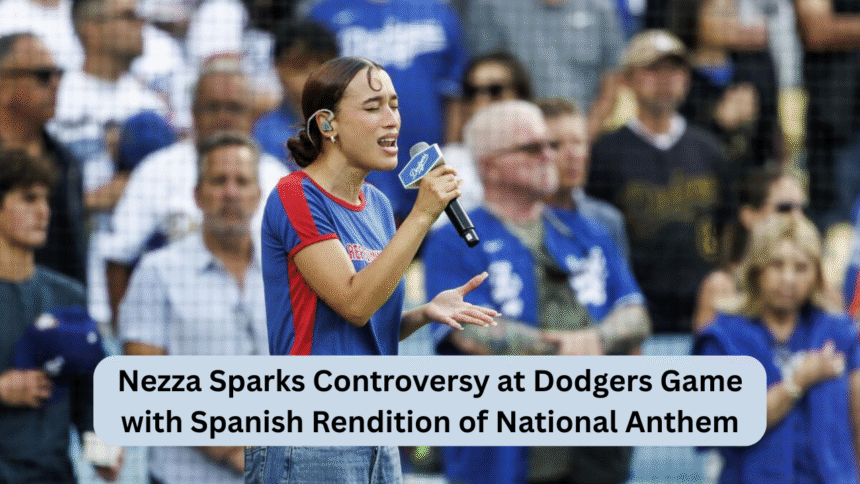Nezza sparked controversy at the Dodgers game after delivering a heartfelt rendition of the U.S. national anthem in Spanish. The performance came despite direct instructions from the team to sing the anthem in English. The rising Latinx artist chose authenticity and protest over compliance, turning a sports event into a national talking point.
Fans at Dodger Stadium were caught off guard as Nezza began to sing “El Pendón Estrellado,” the Spanish version of “The Star-Spangled Banner.” Many applauded, while others looked confused or uneasy. For Nezza, it was not just about music—it was about representing identity, community, and resistance against current immigration policies.
Defying Instructions: Nezza Refuses to Stay Silent
Before the game, Nezza was reportedly told by Dodgers officials to stick to the English version of the anthem. The reasoning was said to be “maintaining tradition.” But for Nezza, tradition doesn’t mean erasing heritage. “I was asked to sing it in English. But today, out of all days, I needed to do it this way,” she said after the performance.

‘Watch the Dodgers tell me I can’t sing the Spanish Star-Spangled Banner that Roosevelt literally comissioned in 1945,’ she captioned the post. ‘So I did it anyway,’.
“I didn’t think I would be met with any sort of ‘no,’ especially because we’re in L.A., and with everything happening … I just could not believe when she walked in and told me ‘no.’ I just felt like I needed to do it,” Nezza said.
Nezza, a singer known for fusing Latin culture with modern pop, has always used her platform to speak on social issues. Her decision to perform the national anthem in Spanish came on the heels of nationwide protests against harsh immigration crackdowns. For her, the moment symbolized resistance. It was about honoring her roots and the struggles of countless families facing deportation threats.
Her voice trembled with emotion as she reached the final lines. The stadium went silent. The applause that followed was mixed with murmurs and confused expressions. Yet, Nezza stood tall, wiping away tears.
Public Reaction: A Nation Divided Over Language and Identity
The performance went viral within minutes. On social media, reactions ranged from passionate support to pointed criticism. Latinx communities and civil rights activists hailed Nezza as a hero. Many said her performance gave them chills, praising her courage and cultural pride.
Others accused her of disrespecting national traditions. A portion of fans said they were disappointed that she used the national anthem as a political statement. But even critics admitted that Nezza’s voice was powerful and the message impossible to ignore.
Across television and online platforms, discussions exploded. Commentators debated the role of language in national symbols. Is singing the anthem in Spanish unpatriotic? Or is it a reflection of a diverse America? Nezza became the face of that conversation.
The Artist Behind the Protest: Who is Nezza?

Nezza, a bilingual artist of Dominican and Colombian descent, has been rising in popularity thanks to her genre-blending music and outspoken activism. She first gained attention on social media platforms, where she would perform both English and Spanish covers. Her transition into original music has been marked by themes of love, empowerment, and social justice.
Before the Dodgers game, Nezza had already built a loyal fanbase. Her performances frequently include messages about unity, self-acceptance, and cultural pride. The national anthem moment was not a publicity stunt—it was a reflection of her identity.
Those close to her say she rehearsed both versions of the anthem. But on the day of the game, she decided the Spanish version was what the moment called for. It wasn’t about defiance. It was about truth.
Dodgers Respond: “We Respect Her Voice, But…”
Following the performance, Dodgers staff released a carefully worded statement. They acknowledged Nezza’s talent and the importance of artistic expression. However, they also reiterated their preference for maintaining a uniform experience during national ceremonies.
“We ask performers to adhere to traditional formats for consistency,” a representative noted. “While we understand the passion behind this performance, we encourage future participants to communicate any changes in advance.”
The statement sparked further debate. Supporters of Nezza accused the team of tone-deafness, failing to recognize the deeper meaning of her choice. Critics of her move felt it disrupted the spirit of the game. Either way, the Dodgers now find themselves at the center of a cultural flashpoint.
Not the First Time: A Pattern of Protest Through Song
Nezza is not the first artist to use the national anthem as a platform for protest. Over the past decade, numerous singers and athletes have made headlines by kneeling, raising fists, or altering lyrics. What sets Nezza apart is her use of language as the medium.
Singing the anthem in Spanish brought to light a tension that many Americans feel but rarely confront: Who gets to define patriotism? Is the anthem less meaningful in another language, or more powerful because it reaches more people?
For millions of Spanish-speaking Americans, Nezza’s rendition felt like recognition. It told them they, too, belong under the banner of the stars and stripes.
Moving Forward: The Legacy of One Song
Nezza has not apologized for her performance. In interviews, she stands firm in her decision. “I wasn’t trying to disrespect anyone,” she said. “I just wanted to sing it for the people who feel like this country doesn’t see them.”
That message continues to resonate. Supporters are organizing online campaigns to promote multilingual renditions of the national anthem. Petitions are being circulated to allow future performers to choose their preferred language.
Meanwhile, Nezza’s social media pages are flooded with messages of love, support, and thanks. People are sharing their stories—of deportations, of fear, of hope—and crediting her for giving them a voice.
A Moment That Changed the Game
Nezza sparked controversy at the Dodgers game, but she also sparked something greater. Her performance wasn’t just about language. It was about who we are as a nation—and who we’re willing to include in our symbols, traditions, and dreams.
Whether people agreed or disagreed, they listened. They talked. They felt. That, perhaps, is the true power of protest: not in the noise, but in the impact it leaves behind.
Nezza may have sung in Spanish, but her message was universal.
Also read Drew Brees Makes His NBC Debut, Internet Amazed by His New Hair.

